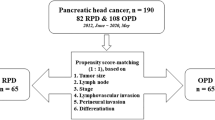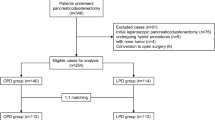Abstract
Background
To date, no study has reported long-term oncologic outcome for patients undergoing laparoscopic pancreaticoduodenectomy (LPD) compared to open surgery (OPD). The aim of this study is assess long-term oncologic outcomes for patients with adenocarcinoma undergoing LPD versus OPD using propensity score weighting modeling to minimize selection bias.
Patients and methods
All patients undergoing PD at Institut Mutualiste Montsouris between January 2000 and April 2010 were included. Propensity scores were calculated using multivariate logistic regression, relating preoperative covariates to surgical approach. Logistic regression was performed, and Cox proportional hazards models for postoperative outcomes were constructed, with and without adjustment for propensity scores weights.
Results
Among 87 patients who underwent PD, 40 underwent LPD and 25 OPD for confirmed adenocarcinoma. Preoperative covariates across both groups were comparable. The median follow-up time was 34.5 months. During follow-up, metastasis was identified in 16 (40%) LPD and 7 (28%) OPD patients. After propensity score adjustment, the median overall survival (OS) was 35.5 versus 29.6 months, respectively. The 1-, 3-, and 5-year OS rates were 80.5, 49.2, 39.7% and 77.8, 46.4, 30% in the LP and OPD groups (P = 0.41, 0.42, 0.25), respectively. The median recurrence-free survival (RFS) was 21.5 versus 13.7 months (LPD vs. OPD), and the 1-, 3-, and 5-year RFS rates were 70.9, 33.3, 21.9% and 62.3, 37.9, 25.7% in the LP and OPD groups (P = 0.27, 0.37, 0.39), respectively.
Conclusions
Due to the early adoption of LPD, this study is the first to report on long-term oncologic safety of LPD: LPD is non-inferior to OPD with respect to long-term outcomes for patients with adenocarcinoma.



Similar content being viewed by others
References
Gagner M, Pomp A (1994) Laparoscopic pylorus-preserving pancreatoduodenectomy. Surg Endosc 8:408–410
Gagner M, Pomp A (1997) Laparoscopic pancreatic resection: is it worthwhile? J Gastrointest Surg 1:20–25 discussion (25–26)
Palanivelu C, Jani K, Senthilnathan P et al (2007) Laparoscopic pancreaticoduodenectomy: technique and outcomes. J Am Coll Surg 205:222–230
Kendrick ML, Cusati D (2010) Total laparoscopic pancreaticoduodenectomy: feasibility and outcome in an early experience. Arch Surg 145:19–23
Asbun HJ, Stauffer JA (2012) Laparoscopic vs open pancreaticoduodenectomy: overall outcomes and severity of complications using the Accordion Severity Grading System. J Am Coll Surg 215:810–819
Cho A, Yamamoto H, Nagata M et al (2009) Comparison of laparoscopy-assisted and open pylorus-preserving pancreaticoduodenectomy for periampullary disease. Am J Surg 198:445–449
Zureikat AH, Breaux JA, Steel JL et al (2011) Can laparoscopic pancreaticoduodenectomy be safely implemented? J Gastrointest Surg 15:1151–1157
Lei P, Wei B, Guo W et al (2014) Minimally invasive surgical approach compared with open pancreaticoduodenectomy: a systematic review and meta-analysis on the feasibility and safety. Surg Laparosc Endosc Percutaneous Tech 24:296–305
Correa-Gallego C, Dinkelspiel HE, Sulimanoff I et al (2014) Minimally-invasive vs open pancreaticoduodenectomy: systematic review and meta-analysis. J Am Coll Surg 218:129–139
Howard TJ, Krug JE, Yu J, et al (2006) A margin-negative R0 resection accomplished with minimal postoperative complications is the surgeon’s contribution to long-term survival in pancreatic cancer. J Gastrointest Surg 10:1338–1345 discussion (1345–1346)
Croome KP, Farnell MB, Que FG, et al (2014) Total laparoscopic pancreaticoduodenectomy for pancreatic ductal adenocarcinoma: oncologic advantages over open approaches? Ann Surg 260:633–638 discussion (638–640)
Gumbs AA, Gayet B, Hoffman JP (2011) Video: laparoscopic whipple procedure with a two-layered pancreatojejunostomy. Surg Endosc 25:3446–3447
Subar D, Gobardhan PD, Gayet B (2014) Laparoscopic pancreatic surgery: an overview of the literature and experiences of a single center. Best Pract Res Clin Gastroenterol 28:123–132
Farrow SC, Fowkes FG, Lunn JN et al (1984) Epidemiology in anaesthesia: a method for predicting hospital mortality. Eur J Anaesthesiol 1:77–84
Bassi C, Dervenis C, Butturini G et al (2005) Postoperative pancreatic fistula: an international study group (ISGPF) definition. Surgery 138:8–13
Dindo D, Demartines N, Clavien PA (2004) Classification of surgical complications: a new proposal with evaluation in a cohort of 6336 patients and results of a survey. Ann Surg 240:205–213
Li L, Greene T (2013) A weighting analogue to pair matching in propensity score analysis. Int J Biostat 9:215–234
Cox D (1972) Regression models and life tables. J R Stat Soc 34: 187–220
Song KB, Kim SC, Hwang DW et al (2015) Matched Case-Control Analysis comparing laparoscopic and open pylorus-preserving pancreaticoduodenectomy in patients with periampullary tumors. Ann Surg 262:146–155
Dokmak S, Fteriche FS, Aussilhou B et al (2015) Laparoscopic pancreaticoduodenectomy should not be routine for resection of periampullary tumors. J Am Coll Surg 220:831–838
Bonjer HJ, Deijen CL, Haglind E et al (2015) A randomized trial of laparoscopic versus open surgery for rectal cancer. N Engl J Med 373:194
Acknowledgements
The University of Texas MD Anderson Cancer Center is supported in part by the NIH/NCI under Award Number P30CA016672
Author contributions
Idea conception: CC, VB, GP, DZ, LL, HCC, DF, BG. Data collection: CC, VB, GP, DZ, BG. Writing: CC, VB, GP, DZ, LL, HCC, DF, BG. Data analysis: CC, VB, GP, DZ, LL, HCC, DF, BG. Critical revision: CC, VB, GP, DZ, LL, HCC, DF, BG.
Author information
Authors and Affiliations
Corresponding author
Ethics declarations
Disclosures
Drs. Claudius Conrad, Valeria Basso, Guillaume Passot, Daria Zorzi, Liang Li, Hsiang-Chun Chen, David Fuks, and Brice Gayet have no conflicts of interest or financial ties to disclose.
Rights and permissions
About this article
Cite this article
Conrad, C., Basso, V., Passot, G. et al. Comparable long-term oncologic outcomes of laparoscopic versus open pancreaticoduodenectomy for adenocarcinoma: a propensity score weighting analysis. Surg Endosc 31, 3970–3978 (2017). https://doi.org/10.1007/s00464-017-5430-3
Received:
Accepted:
Published:
Issue Date:
DOI: https://doi.org/10.1007/s00464-017-5430-3




